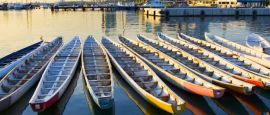Philippines History, Language and Culture
History of Philippines
Inhabited for some 250,000 years, by the time the Spanish arrived in the 16th century the islands had been trading with Chinese merchants for hundreds of years and Islamic settlers from Brunei lived in the south of the archipelago.
The Spanish turned these disparate islands into a nation named in honour of King Phillip II and introduced Roman Catholicism, which had an impact that continues to be felt today, with most Filipinos identifying themselves as Catholics.
Throughout the Spanish era, the mountain tribes struggled against colonial rule and a revolution began in 1896, but saw the Filipino forces defeated. The Spanish-American War (1898) ended with the USA taking possession of the Philippines, sparking the three-year Philippine-American War (1899-1902) during which atrocities were committed on both sides.
The American occupiers were resisted for many years, but did improve standards of education and infrastructure and finally allowed elections and commonwealth status in 1935. In WWII, the Japanese occupied the country and many of the major cities were devastated.
After the war, the Philippines became one of the founding members of the United Nations and democracy was restored. In 1965 Ferdinand Marcos was elected president and, together with his wife Imelda, set out to modernise the country and rein in the elite families which had long dominated the Philippines. He declared martial law in 1972, strengthening his grip on power and ruthlessly crushing dissent while plundering the country’s coffers.
Marcos was deposed in 1986 at the hands of a popular uprising led by Cory Aquino, the wife of assassinated presidential rival Ninoy. Initial euphoria about a return to democracy turned to scepticism as successive administrations were accused of corruption, cronyism and self-interest.
Today wealth distribution remains very uneven, which goes some way to explaining the high number of Filipinos working abroad and sending money home.
Did you know?
• The Beatles played two sell-out shows to 80,000 people in Manila on 4 July 1966, but inadvertently missed a presidential reception. The next day they were spat at and jostled as they left the country vowing never to return.
• The Philippines was the first Southeast Asian country to win an Olympic medal.
• The country is one of the most biologically diverse nations on the planet, home to more than 100 mammal and 170 bird species, which are not found elsewhere.




 You know where
You know where